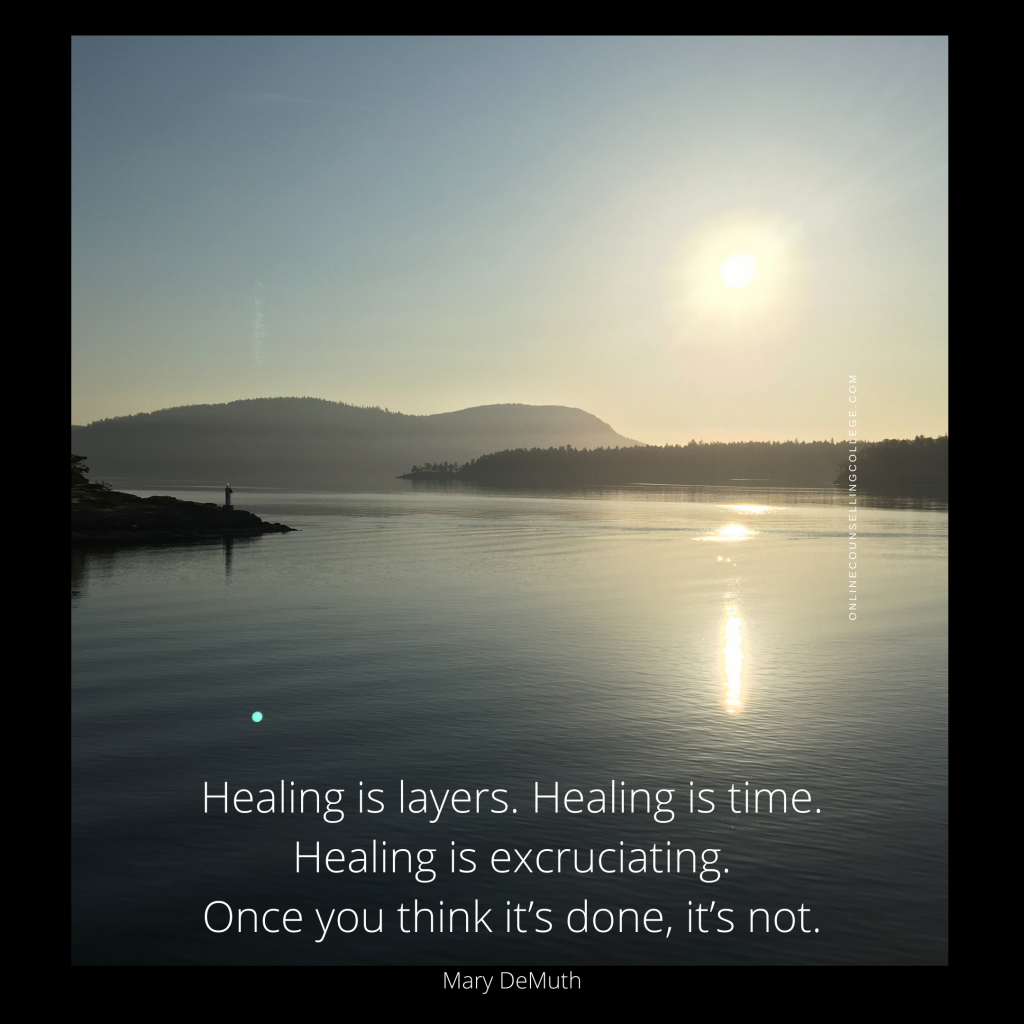
“Healing is layers. Healing is time. Healing is excruciating. Once you think it’s done, it’s not.” – Mary DeMuth
But it does get easier, and it does get better.
Even though it feels interminable at times.
Don’t give up. Don’t give in to the despair.


“Healing is layers. Healing is time. Healing is excruciating. Once you think it’s done, it’s not.” – Mary DeMuth
But it does get easier, and it does get better.
Even though it feels interminable at times.
Don’t give up. Don’t give in to the despair.
Reblogged this on Disablities & Mental Health Issues.
LikeLiked by 2 people
Thanks Kenneth!
LikeLiked by 1 person
Exactly the right words at precisely the right moment. Thank you. 😊
LikeLiked by 1 person
Aw … I’m so glad. Thanks for passing that on, NZain. I hope today turns out to be a good day for you – in the end.
LikeLiked by 1 person
This morning I was concerned not about myself—but for a dear friend who struggles with alcohol addiction/PTSD/betrayal. I’m starting to see patterns of withdrawal and relapse…and it’s heartbreaking for me to watch. I feel helpless.
But I don’t want to give up on my friend…if anything it shows me the changes I need to make in myself to be a supportive friend. So yes, your words of encouragement first thing in the morning are always welcome and remind me to be more gentle with myself and others who are struggling…and healing. 💚
LikeLiked by 1 person
Addictions are SO hard to beat, and we really need other people to believe in us. If they believe in us, sometimes we can find the strength to believe in ourselves, too. You’ve no idea how much you are supporting this friend. Don’t underestimate the good you are doing in her life. I’m so glad you are there for her.
LikeLiked by 1 person
Thank you. That really helps. Sometimes I wonder…the last thing I want to do is enable the addiction—or push my friend (him) away. His tendency to withdraw because of shame is the hardest part for me. I recently asked him if he had any suggestions for me how I could be a supportive friend…still waiting for the answer. And it goes both ways—he is there for me as well with a great sense of humor!
There is so much wonderful in this person—I know I can’t save him—but dang it’s difficult to care! I do believe in him…and I pray—and he knows it.
LikeLike
I plan to share this quote with a healing circle I meet with. Thanks for sharing with us.
LikeLiked by 2 people
Thank you! I really hope it is an encouragement to someone in the group. Have a beautiful day 🙂
LikeLike
Thanks for sharing these blessed words. I made a note to check out more from Mary DeMuth.
LikeLiked by 3 people
♥️
LikeLiked by 1 person
Reblogged this on Survivors Blog Here Mental Health Collaborative .
LikeLike
I found healing reading Mary Demuth books. Good reminders about healing being layers and I too believe we will be healing till Jesus takes us home. Just the other day I heard a message that took off another layer and more freedom filled my soul. Thanks for this post.
LikeLiked by 1 person
Thanks or taking the time to comment. Yes, healing is layers. I’m glad that one day we will experience true and complete healing in heaven 🙂
LikeLike
[…] Don’t Give Up — Don’t Lose Hope […]
LikeLike
Cannot afford to give. We have to keep pressing on. Thanks for these encouraging words.
LikeLiked by 2 people
Yes, we have to keep fighting – for ourselves, for our future, for others who are going through something similar, and need our encouragement. Thanks Beverley! Have a great weekend 🙂
LikeLiked by 1 person
You are welcome.
LikeLiked by 1 person
This is so inspiring.
LikeLiked by 1 person
Thank you!
LikeLiked by 1 person
Considering that so much of our lifelong health comes from our childhood experiences, childhood mental health-care should generate as much societal concern and government funding as does physical health, even though psychological illness/dysfunction typically is not immediately visually observable.
Trauma from unhindered toxic abuse, for example, typically results in the helpless child’s brain improperly developing. If allowed to continue for a prolonged period, it can act as a starting point into a life in which the brain uncontrollably releases potentially damaging levels of inflammatory stress hormones and chemicals, even in non-stressful daily routines. It has been described as a continuous, discomforting anticipation of ‘the other shoe dropping’ and simultaneously being scared of how badly you will deal with the upsetting event, which usually never transpires. The lingering emotional/psychological pain from such intense trauma is very formidable yet invisibly confined to inside one’s head. It is solitarily suffered, unlike an openly visible physical disability or condition, which tends to elicit sympathy/empathy from others. It can make every day a mental ordeal, unless the turmoil is treated with some form of medicating, either prescribed or illicit.
LikeLike